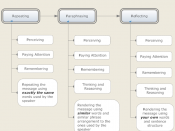Conflict Management
The principles of conflict management
Dr. Kenneth W. Thomas defines conflict as the process which begins when we perceive that someone has negatively affected, or is about to negatively affected, something we care about. The more deeply we care about something the more intense the conflict.
The traditional approach holds that all conflict is bad and that a good manager will work to minimize conflict at all costs. Now we learn to view conflict as potentially helpful, because it increases an organization's competency and productivity.
There is no good or bad conflicts, it's the way we deal with it that determine the outcome, giving us the potential to enhance or lessen the quality of our relationships with one another. Depending on how they are handled, conflicts can produce constructive behaviour and positive outcomes or destructive behavior and Negative outcomes
The constructive conflict is the positive behaviour towards the conflicts, which will usually produce a positive outcome, e.g.
fostering of innovation; diversity of opinion; creative tension; intellectual growth; opportunity for change and catharsis.
Destructive conflict is the negative behaviour applied to the conflict and it usually result of a negative outcome. E.g. damaged relationships; diminished productivity; low morale; failure of purpose.
Conflict situation:
Joe bought a pair of shoes in a shoe store with one year warranty. Just after a month, one of the shoes is broken. Joe took the shoes to the shoe store hope to get a refund of replace it. But the shop assistant would not do that, and she think it is Joe's fault that the shoe was broken; it's not a problem with the quality of the shoes.
There are five conflict management styles that could solve the conflict, these include: Avoiding, Accommodating, Competitive, Compromising and Collaborating.
Avoiding is when we take no action...


